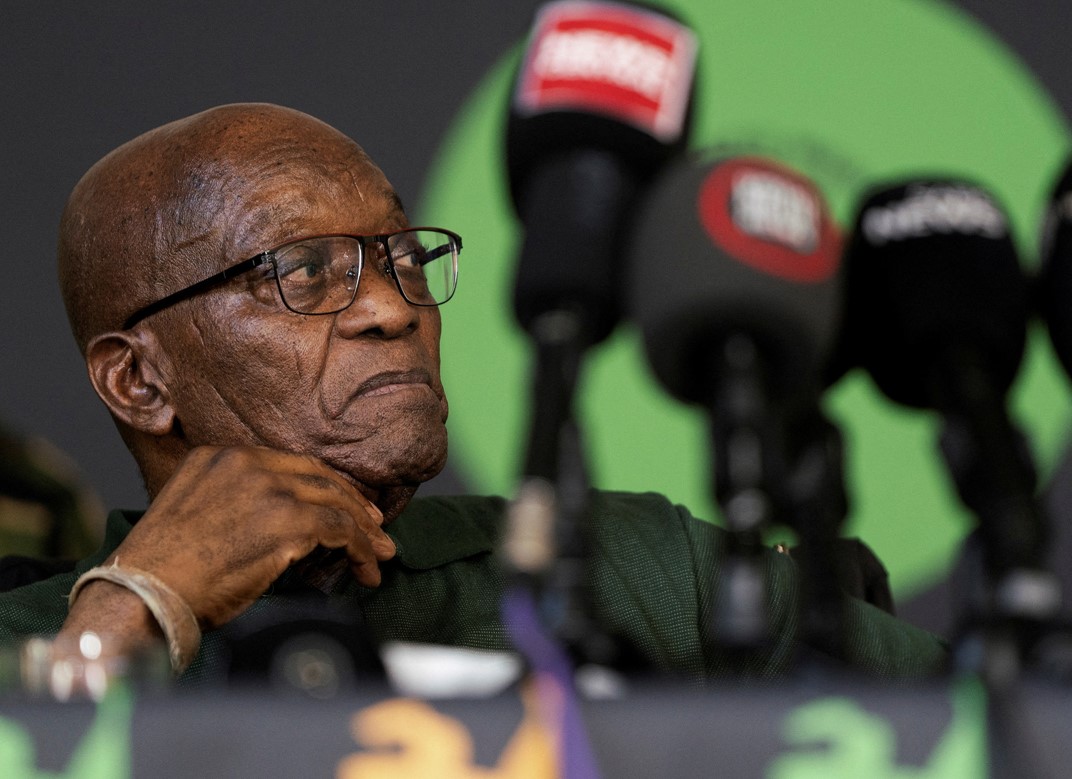South Africa's ex-leader Zuma barred from standing in election

Zuma, who was forced to quit as president in 2018, has fallen out with the governing African National Congress (ANC) and has been campaigning for a new party called uMkhonto we Sizwe (MK) named after the ANC's formed armed wing.
South Africa's former president Jacob Zuma is barred from running for parliament in this month's election, the country's top court ruled on Monday, a judgment that could influence the outcome and trigger unrest from Zuma's supporters.
The constitutional court found Zuma's 15-month jail sentence for contempt of court in 2021 disqualified him from standing in the May 29 election, as the constitution prohibits anyone given a prison sentence of 12 months or longer from holding a parliamentary seat.
More To Read
- Zuma’s daughter resigns from Parliament amid claims she sent South African men to fight in Russia-Ukraine war
- Jacob Zuma's daughter Duduzile under probe for alleged recruitment of fighters for Russia
- G20 summit in South Africa adopts declaration despite US boycott
- South Africa rejects US plan to send Chargé d’Affaires for G20 handover
- South Africa denounces Trump’s G20 boycott, calls genocide claims false
- Durban court trial of Jacob Zuma’s daughter sparks claims of political persecution
"It is declared that Zuma was convicted of an offence and sentenced to more than 12 months' imprisonment, ... and is accordingly not eligible to be a member of, and not qualified to stand for election to, the National Assembly," its ruling said.
Zuma, who was forced to quit as president in 2018, has fallen out with the governing African National Congress (ANC) and has been campaigning for a new party called uMkhonto we Sizwe (MK) named after the ANC's formed armed wing.
Opinion polls suggest the ANC's majority is at risk after 30 years in power, and MK represents a threat to it, especially in Zuma's home province of KwaZulu-Natal where he is popular.
In 2021 Zuma's jailing triggered riots in KwaZulu-Natal in which more than 300 people died which morphed into a wider spate of looting.
"Not concerned"
Asked about the potential for violence in the wake of the constitutional court ruling during an interview with local radio station 702, President Cyril Ramaphosa said: "I'm not concerned about this instigating violence."
"We have a rule of law in South Africa that governs us. Once a constitutional court has decided, that is it and should there be any threat of violence our security forces are ready," he said.
South Africa's electoral commission originally disqualified Zuma in March, but a month later a court overturned the disqualification saying the relevant section of the constitution applied only to people who had a chance to appeal against their sentences, which had not been Zuma's case.
The electoral commission then took the case to the constitutional court. It said previously that even if Zuma was disqualified from standing as a member of parliament, his face would still appear on ballots this month as he is the registered leader of the MK party.
An Ipsos opinion poll published in April put support for MK at roughly 8%, versus just over 40% for the ANC.
While the ANC is still on track to get the most votes, if it gets less than 50% support it would have to seek one or more coalition partners to govern the country, the first such alliance since the party swept to power under liberation hero Nelson Mandela at the end of apartheid.
At a campaign rally for his MK party on Saturday, Zuma told thousands of supporters in a stadium in South Africa's biggest township Soweto that his party would provide free education for disadvantaged children and create jobs.
Top Stories Today














































